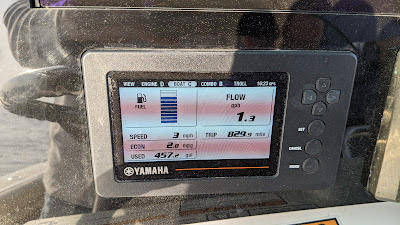For a new boater, docking is perhaps the most stressful part of a day on the water. Time and again we see boaters struggle with control of their boat as they put on a show for bystanders and boaters alike. But it doesn't need to be that way!
The first thing to do is consider the environment around the dock you are approaching. You can do this before you get there. You absolutely don't want to be repositioning fenders and dock lines as you are on the final approach to your mooring point.
"Prior planning and preparation prevents poor performance." Expand your time available for the docking maneuver by thinking ahead!
Is there a tide running? (crab trap floats?) Is the wind blowing? (flags?) Which of these two forces is having the greatest effect on your vessel? If you know how your destination dock is oriented you can plan to put your fenders and lines on the side that allows you to make your approach INTO the current or wind, whichever is stronger. It's a very good practice to stop your boat well away from the dock, pointed at it. Observe what the wind and current are doing to you. Now verify or place your fenders and lines.
Current isn't something to be afraid of, it's something to work with. If you are working against a current as you approach a dock, it's very easy to get rid of headway; just go to neutral with your shifter! Come to think of it, when you are approaching a dock, neutral is your friend. Only use as much time in gear as absolutely needed to maintain control of the boat.
Think of balancing a baseball bat that is standing upright on your palm; as long as you keep your hand under the bat, you can do it. If you let the bat get too far off-center, it's going to fall. When you have your boat's bow into a strong current, the current is like the gravity that works on the bat, and the motor is like your palm that must stay under the bat. Don't let it get away from you. Easy with the power and steering...
Never make an approach to a corner of a dock! (read that again!) Your fenders will protect the side of your boat as you make contact with a flat dock face. But a corner will hole your boat!
One sure sign of a boater in a panic is loud bursts of full power near a dock. This often ends badly. Think ahead, take the easiest option available and take your time. If you don't like how the maneuver is going, break off the approach, go away from the dock, and collect yourself. Relax, calm down, and try it again. Slow and steady, friend!
 |
| Keep your dock lines clear of knots and snags. You may need that line to slide smoothly from around the horn of a cleat someday. |
If the wind is blowing onto the dock, and you have a spot to go to on the outer face, all you need to do is make your approach slowly and under control (use short pulses of power by putting the motor just in gear for a couple of seconds, then back to neutral). You can make a shallow angle approach or even an approach parallel to the dock. When you are abeam your spot, stop and let the wind do the work of moving you sideways.
If a strong wind is blowing OFF the dock, make your approach angle steeper. Position an assistant near the bow (or ask for help on the dock) to place a bow line around a cleat. (Keep fingers from between cleat and line). With the front of the boat attached to the dock, turn the wheel toward the dock and place the engine just in reverse (minimal power). The engine will pull the rear of the boat into the dock. The fenders will cushion the contact. And you can then fasten a stern line to a cleat.
Warn your passengers to keep feet and hands inside the boat during docking. Fiberglass is cheaper than fingers. They should stay seated and still while you are working the boat to the dock.
Make sure that boat is secured to the dock at both ends and protected by fenders before leaving. You might need to adjust lines more than once. If you need to move the fenders, do so. Take the time to do this right. Make it look like a pro did it!
 |
| Wrong! |













